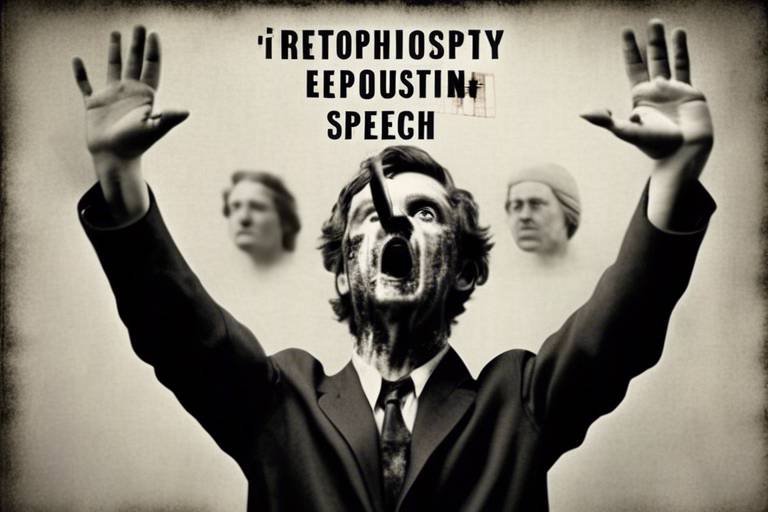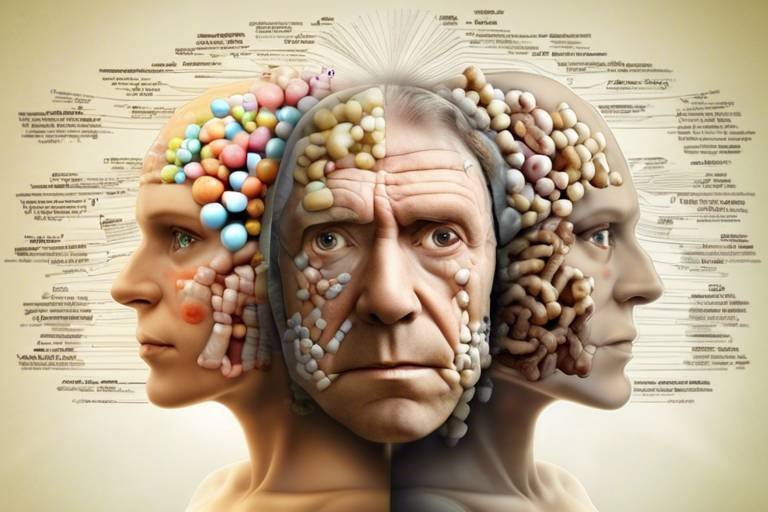Is Philosophy Compatible with Neuroscience?
When we think about philosophy and neuroscience, it might seem like we're mixing oil and water. After all, one delves into the abstract realms of thought, ethics, and existence, while the other is grounded in the tangible world of brain scans and neural pathways. But what if I told you that these two fields are not just compatible but can actually complement and enhance our understanding of the mind and consciousness? In this exploration, we will take a closer look at how philosophy and neuroscience inform each other, bridging the gap between the ethereal nature of thought and the concrete workings of the brain.
The relationship between philosophy and neuroscience is not just a modern phenomenon; it's a historical tapestry woven through centuries of inquiry. From the ancient philosophers like Plato and Aristotle, who pondered the essence of the soul, to contemporary thinkers who grapple with the implications of brain research, the dialogue between these disciplines has evolved dramatically. The advent of neuroscience has sparked a renaissance in philosophical thought, challenging age-old assumptions and prompting new questions about the nature of consciousness and human behavior.
So, how do these two domains intersect? On one hand, neuroscience provides empirical data that can either support or challenge philosophical theories about the mind. For instance, discoveries in neuroplasticity—the brain's ability to change and adapt—have profound implications for our understanding of free will and personal identity. On the other hand, philosophy offers a framework for interpreting these findings, asking the deeper questions that science alone may not address. This interplay creates a rich dialogue that enhances our grasp of what it means to be human.
As we embark on this journey through the realms of philosophy and neuroscience, we will uncover the historical context that shaped their relationship, explore various philosophical perspectives on the mind, and examine how contemporary neuroscience challenges traditional views on free will, morality, and personal identity. By the end, we hope to illuminate the fascinating compatibility of these two fields and inspire a deeper appreciation for the complexities of the human experience.
- What is the main focus of neuroscience? Neuroscience primarily studies the structure and function of the nervous system, including the brain, to understand how it influences behavior, cognition, and emotions.
- How does philosophy contribute to our understanding of the mind? Philosophy provides critical frameworks and questions that guide our understanding of consciousness, ethics, and the nature of reality, often addressing issues that empirical science cannot fully resolve.
- Can neuroscience explain consciousness? While neuroscience has made significant strides in understanding brain functions associated with consciousness, the subjective experience of being aware remains a complex philosophical question.
- Are free will and determinism compatible? This is an ongoing debate in both philosophy and neuroscience, with various perspectives arguing for or against the compatibility of human agency and deterministic views of the universe.

The Historical Context
To truly grasp the intricate relationship between philosophy and neuroscience, it's essential to take a step back and explore their historical trajectories. The journey begins in ancient times, where philosophical inquiries about the mind and consciousness laid the groundwork for later scientific exploration. Think of it as the philosophical roots of a tree, with neuroscience emerging as the branches that grow from those foundational ideas.
In ancient Greece, philosophers like Socrates and Plato pondered the nature of the soul and the essence of human existence. Plato, for instance, introduced the concept of dualism, suggesting that the mind and body are distinct entities. This idea would echo through the ages, influencing many thinkers who followed. Fast forward to the Enlightenment, and we encounter René Descartes, who famously declared, "I think, therefore I am." Descartes' dualism posited that the mind is a non-physical substance, a notion that would later be challenged by the rise of empirical science.
The 19th century marked a significant turning point. With the advent of modern neuroscience, thanks to figures like Charles Bell and Paul Broca, the study of the brain began to gain traction. These pioneers uncovered the connection between brain function and behavior, suggesting that our thoughts, feelings, and actions could be traced back to physical processes within the brain. This was a seismic shift, as it began to blur the lines between philosophical inquiry and scientific investigation.
As we reached the 20th century, the relationship continued to evolve. The development of technologies like functional magnetic resonance imaging (fMRI) and electroencephalography (EEG) allowed researchers to observe brain activity in real-time. This opened up a treasure trove of data that philosophers could no longer ignore. The empirical evidence began to challenge long-held philosophical assumptions, leading to a rich dialogue between the two fields.
Today, we find ourselves at a fascinating crossroads. Neuroscience is not only informing philosophical debates but also reshaping them. For instance, questions about the nature of consciousness, free will, and personal identity are now being examined through the lens of scientific discovery. This interplay is akin to a dance, where each partner influences the other's movements, creating a complex choreography of thought and inquiry.
In summary, the historical context of philosophy and neuroscience is a tapestry woven from ancient ideas and modern discoveries. Understanding this evolution helps us appreciate how these two fields inform and challenge each other, ultimately enriching our understanding of the mind and human behavior.

Philosophical Perspectives on the Mind
When we dive into the intricate world of the mind, we find ourselves at the crossroads of philosophy and neuroscience. Each discipline brings its own unique lens through which to examine the nature of consciousness, cognition, and the very essence of what it means to be human. Philosophy, with its rich tapestry of ideas, offers various perspectives that challenge and complement the findings of neuroscience. From the age-old debates of dualism and physicalism to contemporary discussions surrounding consciousness, these philosophical inquiries shape our understanding of the mind in profound ways.
At the heart of this discussion are the key philosophical theories that have emerged over centuries. Each theory presents a different viewpoint on how we perceive the mind and its relationship to the body. For instance, dualism, famously championed by René Descartes, posits that the mind and body are fundamentally distinct entities. This perspective raises intriguing questions: Can the mind exist independently of the body? If so, what does that mean for our understanding of consciousness? On the other hand, physicalism argues that everything, including mental states, can be reduced to physical processes. This theory aligns closely with neuroscientific findings, suggesting that our thoughts and feelings are mere byproducts of brain activity.
As we explore these perspectives, it’s essential to consider the implications they have on our understanding of consciousness. Consciousness is not just a buzzword; it’s a complex phenomenon that has puzzled philosophers and scientists alike. Some philosophical traditions argue that consciousness is a fundamental aspect of the universe, while others see it as an emergent property of physical systems. This divergence in thought leads to important questions: Is consciousness something that can be measured and studied scientifically? Or is it an inherently subjective experience that defies empirical observation?
To illustrate these philosophical perspectives, let’s take a closer look at the two primary theories:
| Theory | Description | Key Proponents |
|---|---|---|
| Dualism | The mind and body are separate entities, each with distinct properties. | René Descartes, Plato |
| Physicalism | Everything, including the mind, can be explained in terms of physical processes. | David Armstrong, Daniel Dennett |
As we navigate through these philosophical waters, it becomes clear that the relationship between philosophy and neuroscience is not merely one of conflict but rather a dynamic interplay. Each discipline informs the other, leading to a richer understanding of human behavior and cognition. For example, neuroscientific discoveries about brain function can challenge traditional philosophical views on the mind. Conversely, philosophical frameworks can guide neuroscientists in their quest to uncover the mysteries of consciousness.
In conclusion, the philosophical perspectives on the mind provide a vital context for understanding the complexities of human thought and behavior. Whether one leans towards dualism or physicalism, the exploration of these ideas encourages us to question our assumptions and expand our horizons. As we continue to investigate the mind, it becomes increasingly evident that philosophy and neuroscience are not just compatible; they are essential partners in the ongoing quest to understand what it means to be human.
- What is dualism? Dualism is the philosophical view that the mind and body are distinct and separate entities.
- What is physicalism? Physicalism is the belief that everything, including mental events, can be explained in terms of physical processes.
- How do philosophy and neuroscience interact? Philosophy provides frameworks for interpreting neuroscientific findings, while neuroscience offers empirical data that can challenge philosophical assumptions.
- What role does consciousness play in philosophy? Consciousness is a central topic in philosophy, raising questions about the nature of experience and the mind-body relationship.

Dualism vs. Physicalism
The debate between dualism and physicalism is not just an academic exercise; it's a profound inquiry into the very essence of what it means to be human. At its core, dualism posits that the mind and body are two fundamentally different substances. This perspective, famously championed by René Descartes, suggests that mental phenomena are non-physical and that our consciousness exists independently of our physical bodies. In contrast, physicalism argues that everything, including our thoughts and feelings, can be explained through physical processes. This view aligns closely with the advancements in neuroscience, which increasingly demonstrate that mental states are deeply intertwined with brain activity.
To illustrate the differences between these two perspectives, consider the following table:
| Aspect | Dualism | Physicalism |
|---|---|---|
| Nature of Mind | Non-physical substance | Physical processes |
| Mind-Body Relationship | Separate entities | Interdependent |
| Implications for Free Will | Supports the notion of free will | Challenges traditional views of free will |
The implications of these beliefs extend beyond mere academic discussion. For instance, if dualism holds true, it raises intriguing questions about the afterlife and the existence of a soul. On the other hand, physicalism's emphasis on the brain as the seat of consciousness leads to a more deterministic view of human behavior. This brings us to critical discussions around free will: if our thoughts are merely the result of neurochemical processes, can we truly claim to make autonomous choices?
Moreover, the clash between these two perspectives influences how we interpret neuroscientific data. For dualists, findings that link brain activity to mental states might seem to undermine the uniqueness of consciousness, while physicalists view these findings as validation of their stance. This ongoing dialogue between philosophy and neuroscience is crucial, as it not only shapes our understanding of the mind but also informs fields like psychology, artificial intelligence, and ethics.
In summary, the dualism versus physicalism debate is a rich tapestry of ideas that challenges our understanding of consciousness and the nature of reality itself. As neuroscience continues to uncover the complexities of the brain, these philosophical discussions will remain vital in helping us navigate the intricate relationship between mind and matter.
- What is dualism? Dualism is the philosophical view that the mind and body are distinct and separate substances.
- What is physicalism? Physicalism is the belief that everything, including mental states, can be explained by physical processes.
- How do dualism and physicalism relate to neuroscience? Dualism often views consciousness as separate from the physical brain, while physicalism sees mental states as rooted in brain activity.
- What are the implications of these theories for free will? Dualism supports the idea of free will, while physicalism challenges it by suggesting our choices are determined by physical processes.

Arguments for Dualism
When we dive into the world of dualism, we're stepping into a fascinating debate about the nature of existence itself. Dualism, at its core, posits that the mind and body are fundamentally distinct entities. This perspective has roots in the philosophical musings of great thinkers like René Descartes, who famously declared, "I think, therefore I am." This assertion highlights the idea that our capacity for thought and consciousness is separate from our physical form. But what are the arguments that support this intriguing viewpoint?
One of the primary arguments for dualism is the introspective experience. Many people report a deep sense of self that seems to transcend their physical body. This subjective experience of consciousness suggests that there is something more than just neural processes at play. For instance, when you feel love or grief, it often feels like these emotions arise from a place that is not merely a chemical reaction in the brain. This leads to the conclusion that the mind must exist independently of the body.
Furthermore, dualism can provide a compelling explanation for phenomena that seem difficult to reconcile with a purely physicalist view. Consider the concept of qualia, the individual instances of subjective experience, such as the way you perceive the color red or the taste of chocolate. These experiences are inherently personal and cannot be fully explained by neural mechanisms alone. Dualists argue that such qualitative experiences point to the existence of a non-physical mind that interacts with the physical brain.
Another argument often cited in favor of dualism is the existence of mental causation. This refers to the idea that our thoughts can influence our actions. For example, when you decide to raise your hand, it’s not just a series of electrical impulses in your brain; there’s an intentionality behind that action. Dualists argue that if the mind were merely a product of physical processes, how could it exert such influence? This leads to the assertion that the mind must be a separate entity capable of affecting the physical world.
Moreover, dualism has implications for our understanding of personal identity. If we accept that the mind is a distinct entity, it opens up discussions about what happens to our consciousness after death. This perspective can provide comfort to those grappling with existential questions about mortality and the afterlife. It suggests that our essence, our true self, may continue to exist beyond the physical body, which is a comforting thought for many.
While dualism offers compelling arguments, it’s essential to recognize that it also faces significant challenges, particularly from the physicalist camp. However, the ongoing dialogue between these perspectives enriches our understanding of consciousness and the human experience. As neuroscience continues to uncover the mysteries of the brain, the interplay between these two fields will undoubtedly shape our understanding of the mind-body relationship in profound ways.
- What is dualism? Dualism is the philosophical view that the mind and body are two distinct entities that interact with each other.
- Who is a famous proponent of dualism? René Descartes is one of the most well-known proponents of dualism, famously stating, "I think, therefore I am."
- What are qualia? Qualia refer to the subjective, individual experiences of perception, such as how we perceive colors or tastes.
- How does dualism relate to consciousness? Dualism posits that consciousness is a non-physical entity that exists independently of the physical brain.

Arguments for Physicalism
When we dive into the philosophical waters of physicalism, we find ourselves in a realm where the mind is not seen as a mystical entity floating in the ether, but rather as a product of the physical processes occurring in the brain. This perspective suggests that everything we experience, from our thoughts and emotions to our very consciousness, can be traced back to the intricate dance of neurons and synapses. But what exactly supports this view? Let's unpack the key arguments for physicalism that resonate with both philosophical inquiry and neuroscientific discoveries.
First and foremost, one of the most compelling arguments for physicalism is the empirical evidence provided by neuroscience. As researchers delve deeper into the workings of the brain, they consistently uncover correlations between brain activity and mental states. For instance, studies employing functional magnetic resonance imaging (fMRI) have shown that specific thoughts and emotions activate distinct areas of the brain. This suggests that our mental experiences are not just abstract concepts but are indeed tied to physical processes. The more we learn about the brain, the clearer it becomes that mental phenomena are intricately linked to physical states.
Moreover, physicalism offers a coherent framework for understanding the continuity of life. Consider this: if our minds were entirely separate from our bodies, how could we explain phenomena like brain injuries affecting personality or cognitive function? When someone suffers a traumatic brain injury, their ability to think, feel, and behave can change dramatically. This points to the conclusion that mental states are not just independent experiences but are deeply rooted in our biological substrate. Thus, the argument for physicalism is strengthened by the observable relationship between brain health and mental capabilities.
Another significant aspect of the physicalist argument is the challenge it poses to the notion of supernatural explanations. In a world where science seeks to explain the natural phenomena around us, physicalism aligns with the scientific method, which relies on observable and measurable evidence. By grounding our understanding of the mind in the physical realm, we can avoid the pitfalls of attributing mental experiences to unobservable forces, which often leads to confusion and ambiguity. This scientific grounding not only bolsters the credibility of physicalism but also encourages ongoing research into the mind-brain relationship.
Critics of physicalism often raise the question of subjective experience, or what philosophers call qualia. They argue that no amount of physical explanation can fully capture the richness of our sensory experiences. However, physicalists counter this by suggesting that while qualia may seem elusive, they can still be understood in terms of brain processes. For example, the experience of seeing the color red can be linked to specific neural activities in the visual cortex. By exploring these connections, physicalists argue that even the most subjective experiences can ultimately be explained through physical processes.
In conclusion, the arguments for physicalism present a compelling case for understanding the mind as fundamentally linked to the physical workings of the brain. With empirical evidence from neuroscience, the impact of brain injuries on mental states, and a commitment to scientific inquiry, physicalism provides a robust framework for exploring the complexities of human consciousness. As we continue to unravel the mysteries of the mind, physicalism remains a vital perspective in the ongoing dialogue between philosophy and neuroscience.
- What is physicalism? Physicalism is the philosophical view that everything, including the mind, is ultimately physical and can be explained through physical processes.
- How does neuroscience support physicalism? Neuroscience provides empirical evidence by showing correlations between brain activity and mental states, suggesting that mental experiences are tied to physical processes.
- What are qualia? Qualia are the subjective experiences of perception, such as the way we perceive colors or tastes, which some argue cannot be fully explained by physicalism.

Consciousness and Neuroscience
When we dive into the intriguing world of consciousness, we find ourselves standing at the crossroads of philosophy and neuroscience. It's like trying to decipher a complex puzzle where each piece represents a different aspect of our understanding of the mind. Neuroscience, with its advanced imaging techniques and empirical research, seeks to uncover how brain activity correlates with our conscious experiences. But here’s the kicker: while neuroscience can show us the ‘how’ of consciousness, philosophy probes the ‘why’—why does consciousness exist at all?
One of the most fascinating aspects of consciousness is its subjective nature. Think about it: while you can describe the sensation of tasting chocolate or feeling joy, those experiences are uniquely yours. Neuroscience attempts to map these experiences onto brain activity, revealing patterns that correlate with certain thoughts and feelings. For instance, studies using fMRI scans have shown that specific areas of the brain light up when we experience emotions, suggesting a biological basis for our feelings. However, this raises an essential question: can we reduce the richness of human experience to mere neural processes? Or is there something inherently mysterious about consciousness that defies scientific explanation?
To further explore this relationship, we can look at two significant philosophical theories that intersect with neuroscientific findings: physicalism and dualism. Physicalism posits that everything, including consciousness, is rooted in physical processes. This view aligns well with many neuroscientific discoveries, which suggest that our thoughts and feelings can be traced back to brain activity. On the other hand, dualism argues for a separation between mind and body, implying that consciousness cannot be fully explained by physical processes alone. This dichotomy presents a rich ground for debate, as both perspectives offer valuable insights into the nature of consciousness.
Moreover, the implications of neuroscience on our understanding of consciousness extend to practical applications, such as mental health treatments and artificial intelligence. For instance, as we learn more about the brain's mechanisms, we can develop better therapies for conditions like depression or anxiety. But the ethical questions arise: if we can manipulate consciousness through neurochemical means, what does that mean for our sense of self? Are we merely products of our brain chemistry, or is there something more profound that defines who we are?
In summary, the dialogue between consciousness and neuroscience is ongoing and filled with both excitement and uncertainty. As we continue to unravel the complexities of the brain, we must also remain open to the philosophical inquiries that challenge our understanding of what it means to be conscious. The interplay between these fields not only enriches our comprehension of the mind but also invites us to ponder the very essence of human existence.
- What is consciousness?
Consciousness refers to the state of being aware of and able to think and perceive one's surroundings, thoughts, and feelings.
- How does neuroscience study consciousness?
Neuroscience studies consciousness by examining brain activity through techniques like fMRI and EEG to identify the neural correlates of conscious experience.
- What are the main theories of consciousness?
The main theories include physicalism, which suggests consciousness arises from physical processes, and dualism, which posits a separation between mind and body.
- Can consciousness be measured?
While aspects of consciousness can be measured through brain activity, the subjective experience of consciousness remains challenging to quantify.
- What ethical implications arise from studying consciousness?
Studying consciousness raises ethical questions about free will, personal identity, and the potential manipulation of mental states.

Neuroscience's Impact on Philosophical Thought
Neuroscience has dramatically reshaped the landscape of philosophical inquiry in recent years. As our understanding of the brain expands, so too does the challenge to traditional philosophical concepts. The intricate dance between these two fields has sparked vibrant debates, particularly in areas such as free will, morality, and personal identity. It's fascinating to consider how discoveries in neuroscience can illuminate age-old philosophical questions, often leading to surprising conclusions that might make you rethink your stance on what it means to be human.
One of the most profound impacts of neuroscience on philosophy is its challenge to the notion of free will. For centuries, philosophers have grappled with the concept of human agency, pondering whether our choices are genuinely ours or merely the result of predetermined factors. Neuroscience suggests that many of our decisions are influenced by brain activity that occurs before we are consciously aware of it. This revelation raises critical questions: If our brains are making decisions for us, what does that mean for our sense of self? Are we merely puppets of our neural wiring? These inquiries compel us to reassess our understanding of moral responsibility and personal accountability.
Moreover, neuroscience has also influenced ethical considerations in philosophy. As we delve deeper into the workings of the brain, we uncover insights into why people behave the way they do. For example, studies on empathy and moral reasoning have revealed that our brains are wired to respond to others' emotions, which complicates our understanding of moral judgments. Should we hold individuals accountable for their actions if those actions are influenced by their neurological makeup? This intersection of neuroscience and ethics prompts a reevaluation of how we approach justice and punishment, as well as the moral implications of neurological disorders.
To illustrate the impact of neuroscience on philosophical thought, consider the following table that summarizes key areas of interaction:
| Philosophical Concept | Neuroscientific Insight | Implications |
|---|---|---|
| Free Will | Brain activity precedes conscious decision-making | Challenges the notion of moral responsibility |
| Morality | Neurological basis for empathy and moral reasoning | Influences views on justice and accountability |
| Personal Identity | Understanding of memory and consciousness | Questions the continuity of self over time |
As we can see, the relationship between neuroscience and philosophy is not merely academic; it has real-world implications for how we view ourselves and our interactions with others. The more we learn about the brain, the more we are forced to confront uncomfortable truths about our nature. Are we the architects of our fate, or are we simply products of our biology? This ongoing dialogue between neuroscience and philosophy is crucial for advancing our understanding of human behavior and consciousness.
In conclusion, the impact of neuroscience on philosophical thought is profound and multifaceted. It challenges us to rethink fundamental concepts and encourages a more nuanced view of human nature. As we continue to explore the depths of the brain, we must remain open to the possibility that our understanding of ourselves may evolve in ways we cannot yet imagine.
- How does neuroscience challenge the concept of free will?
Neuroscience suggests that many decisions are made by the brain before we consciously perceive them, raising questions about our agency. - What ethical implications arise from neuroscience?
Understanding the brain's influence on behavior complicates traditional views on moral responsibility and accountability. - Can neuroscience provide insights into personal identity?
Neuroscience explores how memory and consciousness interact, prompting questions about the continuity of self over time.

Free Will and Determinism
Ah, the age-old battle between free will and determinism! It's like the classic rivalry between cats and dogs, each claiming its territory in the realm of human thought. On one side, we have free will—the idea that we can make choices independent of external influences. On the other, we have determinism, which suggests that every action we take is the result of preceding events, governed by the laws of nature. This debate isn't just a philosophical exercise; it has profound implications for how we understand human behavior, morality, and even the legal system.
Neuroscience has thrown a wrench into this debate, offering insights that challenge traditional notions of free will. For instance, studies have shown that our brains begin to initiate actions before we consciously decide to perform them. This raises a compelling question: if our brains are firing off signals that lead to actions before we even think about them, do we truly possess free will? Or are we merely puppets dancing to the tune of our neural circuitry?
Let's break it down a bit. The deterministic view argues that everything, including our thoughts and decisions, is a consequence of prior states. If we consider the universe as a giant clockwork machine, every tick and tock is predetermined by the state of the machine at any given moment. This perspective can be unsettling; it suggests that our sense of agency is an illusion. On the flip side, the free will perspective holds that we can transcend these deterministic chains. We can choose to act differently, even when faced with the same circumstances.
To illustrate this further, let's consider a few key points:
- Neuroscientific Evidence: Experiments involving brain activity and decision-making processes have shown that neural responses can precede conscious awareness of decision-making. This suggests that our brains may be making choices for us before we even realize it.
- Philosophical Implications: If determinism holds true, what does that mean for concepts like moral responsibility? Can we hold someone accountable for their actions if those actions were predetermined?
- Middle Ground: Some philosophers propose a compatibilist view, suggesting that free will and determinism can coexist. In this view, free will is defined as acting according to one's motivations and desires, even if those desires are influenced by prior events.
The implications of this debate extend beyond philosophy into the realms of ethics and law. If we view individuals as products of their environments and biology, it complicates our understanding of punishment and rehabilitation. Should we punish someone for a crime if their actions were determined by factors beyond their control? Or should we focus on reform and understanding the underlying causes of their behavior?
In conclusion, the relationship between free will and determinism is a complex tapestry woven from threads of neuroscience, philosophy, and ethics. As we continue to explore the intricacies of the human mind, we find ourselves at a crossroads, where our understanding of agency, responsibility, and morality may need to be redefined. The quest for answers is not just an intellectual pursuit; it’s a journey into the very essence of what it means to be human.
- What is free will? Free will is the ability to make choices that are not determined by prior causes or external influences.
- What is determinism? Determinism is the philosophical belief that all events, including human actions, are ultimately determined by causes external to the will.
- Can free will and determinism coexist? Some philosophers argue for compatibilism, which suggests that free will and determinism can coexist, allowing for moral responsibility even in a deterministic framework.
- How does neuroscience impact our understanding of free will? Neuroscience has provided evidence that our brains may initiate actions before we consciously decide to act, challenging traditional notions of free will.

Ethics and Neuroscience
As we dive into the intricate web of , it's essential to recognize that the fusion of these two fields is not merely an academic exercise—it has real-world implications that can shape our understanding of human behavior and responsibility. Neuroscience, with its advanced tools and techniques, is uncovering the biological underpinnings of our actions, thoughts, and emotions. But what does this mean for our ethical frameworks? Are we still the authors of our actions, or are we just puppets of our neural circuitry?
One of the most pressing ethical dilemmas raised by neuroscience is the question of free will. If our decisions are influenced or even determined by neural processes, can we truly claim responsibility for our actions? This challenge to traditional notions of free will has sparked heated debates among philosophers, ethicists, and neuroscientists alike. Some argue that understanding the brain's role in decision-making should lead to a more compassionate view of human behavior, while others fear it undermines accountability.
Moreover, neuroscience has introduced the concept of neuromarketing, which examines how brain activity affects consumer behavior. This raises ethical questions about manipulation and consent. Are companies exploiting our neurological vulnerabilities to influence our purchasing decisions? The line between persuasion and coercion becomes increasingly blurred, and society must grapple with the implications of such practices.
Additionally, the advent of technologies like brain-computer interfaces and neuroenhancement raises significant ethical concerns. These technologies can enhance cognitive abilities or even alter personality traits. While the potential benefits are enticing, they also prompt questions about identity and authenticity. If we can modify our thoughts and behaviors at will, what does that mean for our sense of self?
To better understand the ethical landscape shaped by neuroscience, consider the following key areas:
- Responsibility: How do we assign moral responsibility when neural factors influence behavior?
- Privacy: What rights do individuals have over their neurological data?
- Manipulation: Where do we draw the line between influence and exploitation?
- Identity: How do neuroenhancements affect our personal identity and authenticity?
In conclusion, the intersection of is a complex and evolving field that challenges our traditional views on morality, responsibility, and human agency. As neuroscience continues to advance, it is crucial for philosophers, ethicists, and society as a whole to engage in these discussions. The implications of our findings could very well redefine what it means to be human in a world increasingly influenced by our understanding of the brain.
- What is the relationship between ethics and neuroscience? Ethics examines the moral implications of neuroscientific findings, particularly regarding free will, responsibility, and human behavior.
- How does neuroscience challenge traditional views of free will? Neuroscience suggests that many of our decisions may be influenced by neural processes, raising questions about our autonomy and accountability.
- What ethical concerns arise from neuroenhancement technologies? These technologies can alter cognitive abilities and personality traits, leading to debates about identity, consent, and authenticity.
- Can neuroscience inform ethical decision-making? Yes, insights from neuroscience can help shape more compassionate ethical frameworks by understanding the biological basis of behavior.
Frequently Asked Questions
- What is the relationship between philosophy and neuroscience?
Philosophy and neuroscience share a fascinating relationship where each field informs the other. Philosophy raises fundamental questions about the mind, consciousness, and human behavior, while neuroscience provides empirical data that can either support or challenge philosophical theories. This interplay helps deepen our understanding of complex issues surrounding the mind-body connection.
- How do philosophical theories like dualism and physicalism relate to neuroscience?
Dualism and physicalism are two major philosophical perspectives regarding the mind. Dualism suggests that the mind and body are separate entities, while physicalism argues that everything, including the mind, is physical. Neuroscience often aligns with physicalism, as it seeks to explain mental processes through brain activity. However, dualism raises intriguing questions that challenge purely physical explanations, making the debate ongoing and relevant.
- What role does consciousness play in the discussion between philosophy and neuroscience?
Consciousness is a central topic that bridges philosophy and neuroscience. Philosophers ponder the nature of consciousness, asking questions about subjective experience and self-awareness. Neuroscience, on the other hand, investigates the biological underpinnings of consciousness, aiming to uncover how brain activity correlates with conscious thought. This collaboration can lead to a more comprehensive understanding of what it means to be conscious.
- Can neuroscience challenge traditional philosophical views on free will?
Absolutely! Neuroscience has introduced findings that suggest our decisions may be influenced by unconscious processes, raising questions about free will and determinism. Philosophers are now grappling with how these insights affect our understanding of human agency and moral responsibility. This challenge invites a reevaluation of long-held beliefs about free will and the nature of decision-making.
- What ethical implications arise from advancements in neuroscience?
As neuroscience progresses, it brings forth significant ethical considerations regarding behavior and personal responsibility. For instance, if our actions are heavily influenced by neurological factors, to what extent are we accountable for them? Philosophical ethics plays a crucial role in navigating these dilemmas, helping to shape policies and societal norms in light of neuroscientific discoveries.



















